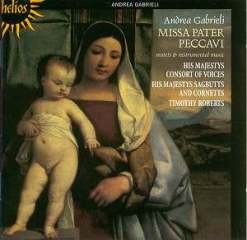Andrea Gabrieli - Missa Pater Peccavi (2007)
Andrea Gabrieli - Missa Pater Peccavi (2007)

1 Ricercar A 4 Del Primo Tuono 6:15 2 Motet De Profundis Clamavi (Psalm 130) 5:28 3 Canzon Alla Francese Petit Jacquet 1:59 4 Missa Pater Peccavi Kyrie 3:45 5 Intonazione Del Sesto Tuono 1:09 6 Missa Pater Peccavi Gloria 5:43 7 Ricercar A 4 Del Sesto Tuono 3:14 8 Missa Pater Peccavi Credo 9:23 9 Madrigal Ancor Che Co'l Partire 4:03 10 Missa Pater Peccavi Sanctus 2:30 11 Missa Pater Peccavi Benedictus 2:20 12 Ricercar A 4 Del Duodecimo Tuono 2:37 13 Missa Pater Peccavi Agnus Dei I II III 4:44 14 Ricercar Del Settimo Tuono 4:00 15 Motet O Sacrum Convivium 3:52 16 Ricercar Per Sonar A 8 3:54 His Majestys Sagbutts And Cornetts (Ensemble) His Majestys Consort Of Voices (Choir) Baritone Vocals – Alastair Hamilton (tracks: 4, 6, 8, 10, 11, 13) Bass Vocals – Adrian Peacock (tracks: 2, 4, 6, 8, 10, 11, 13), Robert MacDonald (tracks: 4, 6, 8, 10, 11, 13) Bassoon [Dulcian] – Keith McGowan (tracks: 7, 16) Cornett – David Staff (tracks: 1, 4, 6 to 8, 10 to 13, 16), Jeremy West (tracks: 1, 2, 4, 5, 8, 10 to 13, 16) Organ [Chamber] – Timothy Roberts (tracks: 3 to 6, 8 to 11, 13, 14, 16) Soprano Vocals – Anna Sarah Pickard (tracks: 4, 6, 8, 10, 11, 13, 15), Julia Gooding (tracks: 4, 6, 8, 10, 11, 13) Tenor Vocals – Joseph Cornwell (tracks: 2, 4, 6, 8, 10, 11, 13) Trombone [Sackbut] – Abigail Newman (tracks: 2, 4, 6, 8, 10, 11, 13, 15, 16), Adam Woolf (tracks: 2, 4, 6, 8, 10, 11, 13,15, 16), Stephen Saunders (tracks: 1, 2, 4, 6, 8, 10 to 13, 15, 16), Susan Addison (tracks: 1, 4, 6 to 8, 10 to 13, 15, 16) Viola [Renaissance] – Oliver Webber (tracks: 7, 16) Conductor – Timothy Roberts
To Andrea Gabrieli - and his nephew Giovanni - a choir wasn’t necessarily a group of singers who sang together. A choir could be a mix of singers and instrumentalists and it was only rarely that you would have many voices to a part. What we regard as a choral piece could just as well be sung by a single voice with instrumental support on the other lines. Generally composers put text on all lines whether they thought of them as vocal or instrumental.
This is something which is too often lost sight of when choral groups come to record this repertoire. So it is heartening to find Hyperion re-issuing their recording of Andrea Gabrieli’s Missa Pater Peccavi. The performances are given by His Majestys Consort of Voices and His Majestys Sagbutts and Cornetts. The name is the key, of course; this isn’t a recording originating with a choir but with an instrumental group with its own consort of voices.
The results are outstanding and even if the disc is not strictly a liturgical reconstruction, the interspersing of the mass movements between motets and instrumental pieces makes for a satisfying whole.
Andrea Gabrieli rose through the ranks to become first organist at St. Mark’s in Venice. He never became maestro di capella. But he wrote a considerable amount of church music for St. Mark’s and for other Venetian churches. The problem is that he didn’t publish it so it is difficult to date his pieces precisely. Missa Pater Peccavi, which is written for six-part choir, was published in 1572 and is a parody mass, being based on Andrea Gabrieli’s motet Pater peccavi in caelum, which was published in 1565 in his earliest published collection.
For the mass six instrumentalists and organ double the six singers, though in certain movements the scoring is reduced to voices and organ or a mixture of voices and instruments. The decisions about what to do when are those of Timothy Roberts and his musicians; we don’t have much to go into specifics in this area.
But what they do is very, very convincing. The singers are superb and provide a well-shaped and beautifully crafted account of the mass. They and the instrumentalists also eradicate any doubts you might have had at balancing six singers with two cornetts and four sagbutts. Andrea Gabrieli's music isn't generally as showy as that of his nephew. Missa Pater Peccavi is a rather sober, considered work which richly repays the attention paid to it in this performance.
For the motets, the group uses a mixture of voices and instruments. De Profundis clamavi, from Gabrieli’s 1572 collection of penitential psalms, is performed with just the third and fifth voices performed by singers and the remainder by instruments. In his booklet note, Timothy Roberts points out that when doing this you have to be careful that you choose parts which include all the words. But when done successfully, as it is here, the results are entrancing as the voices are counterpointed by instruments as well as some sections becoming instrumental ritornelli. For the communion motet, O Sacrum convivium, a solo soprano (Anna Sarah Pickard) is accompanied by four sackbuts to striking results.
The instrumentalists also play five Ricercars. Gabrieli did not write much purely instrumental music and seven Ricercars were published at the end of a collection of madrigals, raising the question that they might have been sung. These are attractive in their own right and help to form a varied and well-balanced programme. The final element in this programme is a group of organ solos, which adds an additional texture to the mix.
This is a well put-together programme, which wears its learning lightly. Gabrieli’s pieces receive superb performances from Timothy Roberts and his forces. Whilst some people will anticipate being disappointed that we get no large-scale choral effects, they should have no such worries. This is an entrancing and convincing foray into Gabrieli’s sound-world and should be on everyone’s library shelves. ---Robert Hugill, musicweb-international.com
download (mp3 @320 kbs):
yandex 4shared mega mediafire cloudmailru uplea
